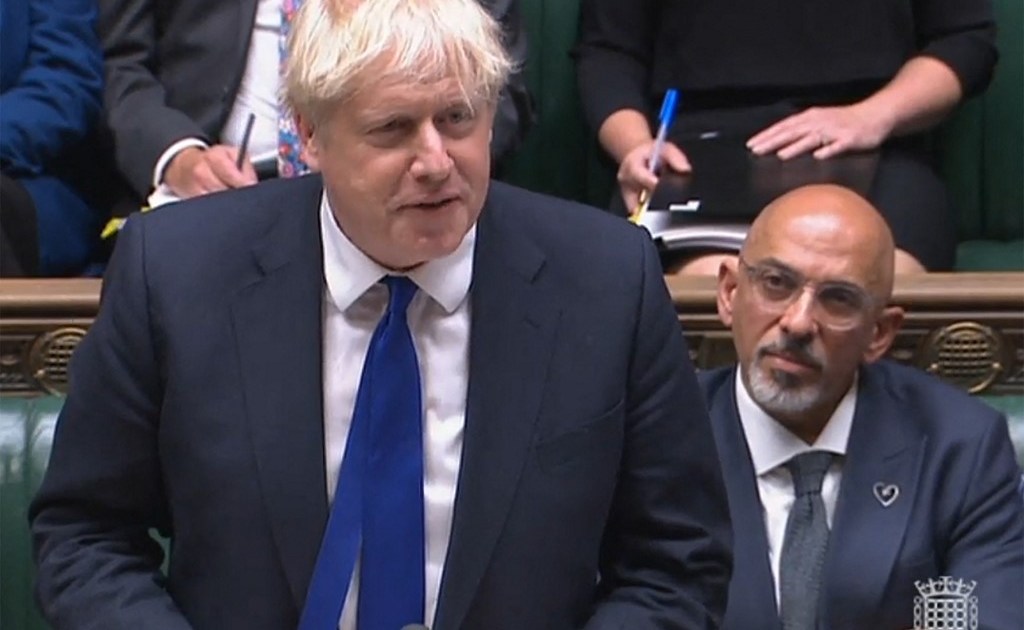UK’s Johnson faces MPs, refuses to quit despite mass resignations
British Prime Minister Boris Johnson has told MPs he would “keep going” despite a growing list of Conservative ministers and other officials resigning in protest over his handling of the case of a senior official accused of sexual misconduct.
“The job of a prime minister in difficult circumstances when you’ve been handed a colossal mandate is to keep going. And that’s what I’m going to do,” Johnson said on Wednesday at the weekly session of Prime Minister’s Questions in parliament.
David Davis, a Conservative legislator who had previously called on the 58-year-old leader to resign, told parliament that he was again asking Johnson: “to do the honourable thing, to put the interests of the nation before his own interest, and before … it does become impossible for government to do its job.”
Johnson said he did not believe that it was against the national interest for him to remain as prime minister.
“I thank him very much for the point he’s made again. I just couldn’t disagree with him more,” Johnson said.
Key resignations
The development came a day after Treasury chief Rishi Sunak and Health Secretary Sajid Javid quit, saying he was not fit to govern.
Johnson quickly replaced the two men but a string of junior ministers have also quit and his support inside the Conservative Party is shrinking rapidly.
Opponents hope to change party rules to allow a new no-confidence vote on Johnson. He survived one such vote last month, with 41 percent of MPs voting against him.
Al Jazeera’s Paul Brennan, reporting from London, said the changes could come as early as next week “when a backbench committee called the 1922 Committee has its executive elections”.
“Several members of the Conservative Party, who are very, very strong critics of Boris Johnson, will be standing for election to that executive with the intention of immediately changing the rules, hoping to force a new confidence vote before the parliament rises for the summer break and that’s on July 21,” he said.
Sexual misconduct scandal
The scandal that kick-started the political crisis involved Chris Pincher the deputy chief whip who resigned last week after he was accused of drunkenly groping two men.
Downing Street at first denied Johnson knew of prior allegations against Pincher when appointing him in February.
But by Tuesday, that defence had collapsed after a former top civil servant said Johnson, as foreign minister, was told in 2019 about another incident involving his ally.
Minister for Children and Families Will Quince quit on Wednesday, saying he was given inaccurate information before having to defend the government in a round of media interviews on Monday.
That triggered a new wave of more than a dozen resignations and the withdrawal of support from previously loyal MPs.

The Pincher affair was the “icing on the cake” for Sunak and Javid, Tory MP Andrew Bridgen, a strident Johnson critic, told the Sky News broadcaster.
“I and a lot of the party now are determined that he will be gone by the summer recess (starting on July 22): the sooner the better,” he said.
The resignations dominated the British media, with even some of Johnson’s staunchest newspaper backers doubting whether he could survive the fallout.
Other senior cabinet ministers, including Foreign Secretary Liz Truss and Defence Secretary Ben Wallace, still back Johnson but many were wondering how long that may last.
Jacob Rees-Mogg, a doggedly loyal cabinet ally and Johnson’s minister for Brexit opportunities dismissed the resignations as “little local difficulties”.
“Losing chancellors is something that happens,” he said on Sky News, pointing to past Tory leaders – although Margaret Thatcher was ultimately felled by a cabinet revolt by top allies.
Sunak’s departure in particular, in the middle of policy differences over a cost-of-living crisis sweeping Britain, is dismal news for Johnson.
‘Partygate’
Johnson, who received a police fine for the so-called “Partygate” affair, faces a parliamentary probe into whether he lied to MPs about the revelations.
Pincher’s departure from the whips’ office – charged with enforcing party discipline and standards – marked yet another allegation of sexual misconduct by Tories in recent months, recalling the “sleaze” that dogged John Major’s government in the 1990s.
Conservative MP Neil Parish resigned in April after he was caught watching pornography on his mobile phone in the House of Commons.
That prompted a by-election in his previously safe seat, which the party went on to lose in a historic victory for the opposition Liberal Democrats.
Labour, the main opposition party, defeated the Conservatives in another by-election in northern England on the same day, prompted by the conviction of its Tory MP for sexual assault.



